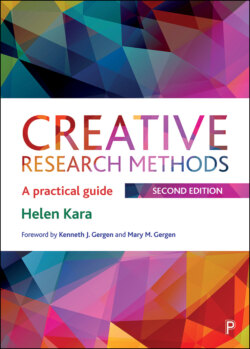Читать книгу Creative Research Methods 2e - Kara Helen - Страница 9
На сайте Литреса книга снята с продажи.
ОглавлениеForeword
Kenneth J. Gergen and Mary M. Gergen
This is an important book, with resounding implications for the social sciences and for cultural life more generally. In its transformative message, author Helen Kara plots a path for social scientists to resist the strangulating demands of a longstanding view of research, and become creators of desired futures. For almost a century the social sciences have been dominated by a conception of research in which carefully controlled and systematic observation provided the path to knowledge. Such a view presumes the fixed nature of the subject matter, and upholds methods that prevent the contamination of knowledge by potential prejudices, especially those of the researchers themselves. Until recent years virtually all books on research methods sustained this conception of knowledge. Or, one might say, books on methods functioned much like marching orders designed to keep the troops in line.
Times have changed, and most social scientists have now come to understand the way knowledgeable propositions are constructed within various scientific enclaves, carrying with them myriad assumptions and values that have no warrant save the negotiated realities of the groups themselves. It is this realisation that has led not only to wide-ranging critiques of the limitations of traditional empirical methods (for example, experimentation, measurement, statistical analysis), but to an enormous flowering of qualitative methods. A new range of handbooks has emerged during the 2010s, offering a wide and exciting range of qualitative methods of enquiry.
Yet, in the present work Helen Kara presses further. She invites researchers to create their practices. Rather than offering endless lists and rationales for what a particular method – qualitative or quantitative – should and should not do, she invites the researcher to deliberate, to imagine and to create. The major question is what the researcher wishes to accomplish: what is worth doing, who is helped or hurt by the research and what ethical and political issues are relevant. Here is a bold invitation for researchers to move beyond the available cookbooks, to mobilise their talents, insights and passions and to create the means to valued ends. In this latest volume Kara explores new territories, capturing the current waves of interest in non-Western approaches to discovery, to embodied research and gendered concerns. She integrates technological advances and internet exploration, as well as providing copious illustrations of culturally significant research. It is an exciting adventure to explore these works from creative researchers around the world. We believe this book could motivate even the most timid researcher to try something new.
